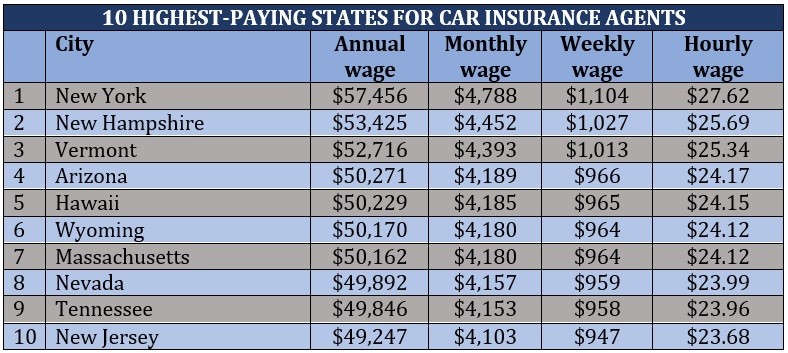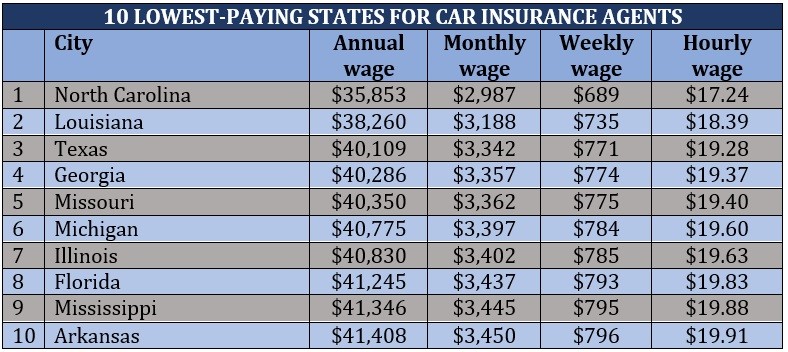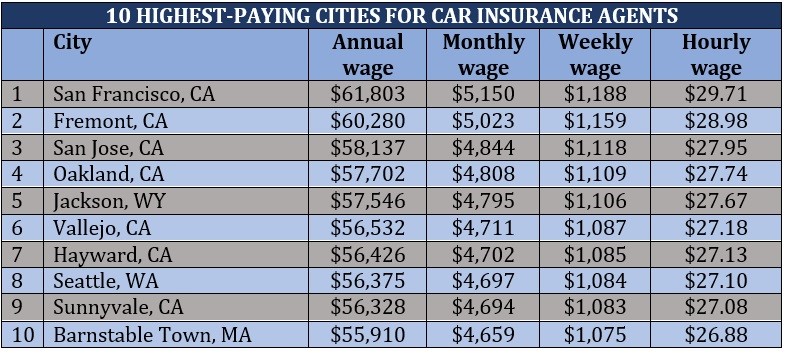

Car insurance is among the most common forms of coverage in the country as almost all states mandate drivers to carry one before they can operate their vehicles. But with the myriad of policies available, motorists are often left confused as to what types of protection they really need.
Enter car insurance agents. These industry professionals represent the insurance companies, helping insurers reach out to clients by explaining to them what policies are offered and the key features and benefits each one brings.
But how much do car insurance agents make? Is it a worthwhile career? How can you achieve success if you choose to be one? Insurance Business answers these questions and more in this article.
There are several factors that affect how much car insurance agents make but based on the employment and industry websites that Insurance Business checked out, the average annual salary falls between the $43,000 and $60,000 range. An agent’s earnings can be significantly higher or lower, depending on different variables, including commission rates, experience level, and partner insurers.
The table below reveals the percentile wage estimates for car insurance agents across the country based on data from this website.
|
PERCENTILE WAGE ESTIMATES (CAR INSURANCE AGENTS) |
||||
|---|---|---|---|---|
|
Percentile |
Annual wage |
Monthly wage |
Weekly wage |
Hourly wage |
|
10th |
$24,000 |
$2,000 |
$461 |
$12 |
|
25th |
$34,500 |
$2,875 |
$663 |
$17 |
|
Average |
$50,408 |
$4,200 |
$969 |
$24 |
|
75th |
$59,000 |
$4,916 |
$1,134 |
$28 |
|
Top earners |
$75,500 |
$6,291 |
$1,451 |
$36 |
Most car insurance agents have average salaries between the 25th and 75th percentile, or about $31,500 to $75,500, according to the website. Figures above or below this salary range are considered outliers.
One of the biggest factors that dictate how much car insurance agents make is where they sell policies. Although almost all states – with the exception of New Hampshire and to some extent Virginia – make it compulsory for motorists to purchase auto insurance, each imposes different requirements (more on this later), which has a direct impact on an agent’s earning potential.
The tables below rank the top and lowest-paying states for car insurance agents.


How much do car insurance agents make in the highest-paying cities across the country? The table below provides the answer.

Now that you have an idea of how much car insurance agents make in different states, it may also be helpful to know how much auto policies costs. Learn more about the most and least expensive states for car insurance by clicking the link.
Car insurance agents can earn an income through the following:
This is the most common way car insurance agents make money. For captive agents, the commission rate is from 5% to 10% of the total premiums in the first year and about 2% to 5% for every renewal. The figure is slightly higher for independent agents at 15% for new policies. For existing plans, the typical rate is also 2% to 5%.
If you want to find out why independent agents earn more than their captive counterparts, you can check out our article on how much independent insurance agents make.
Many captive car insurance agents work full-time as salaried employees for the insurance companies they partner with. They may earn a fixed wage and receive commissions on top of their monthly salary, depending on the terms of their contract with the insurer.
Some insurers that reach a specific profit target share the benefits by giving agents bonuses.
One thing to take note of is that these income-generating methods are not mutually exclusive. Car insurance agents can receive a monthly wage from their partner insurers, along with commissions for every policy they sell and bonuses if an insurer’s sales exceed the yearly target.
How much car insurance agents make depends on a range of factors. These include:
To be a successful car insurance agent, you need to have a combination of hard and soft skills that can allow you to guide clients in getting the best coverage. Here are some of the top skills that will enable you to thrive and grow professionally.
Each state has different rules when it comes to mandatory car coverage, but these are the most common types of policies drivers in the US can access, according to the Insurance Information Institute (Triple-I):
The table below shows the minimum car insurance requirements in each state as well as the link to the websites of the corresponding departments that you can contact if you have questions regarding coverage.
|
State |
Minimum requirements |
|---|---|
|
|
(Coverage optional in remote regions) |
|
|
|
|
|
|
|
|
|
|
|
|
|
|
|
|
|
|
|
|
|
|
|
|
|
|
|
|
|
|
|
|
|
|
|
|
|
|
|
|
|
|
|
|
|
|
|
|
|
|
|
|
|
|
|
|
(Car insurance is not mandatory, but these are the minimum requirements if a driver chooses to take out coverage)
|
|
|
|
|
|
|
|
|
|
|
|
|
|
|
|
|
|
|
|
|
|
|
|
|
|
|
|
|
|
|
|
|
|
|
(Car insurance is not mandatory, but these are the minimum requirements if a driver chooses to take out coverage)
|
|
|
|
|
|
|
|
|
The country is home to more than 500 car insurance companies, with each providing policies with different features and levels of protection. The sector, however, is dominated by a few industry giants, controlling over three-fourths of the overall market. If you want to find out who these industry players are, you can check out our latest rankings of the top car insurance companies in the US, where you can also find the different types of coverage they provide.
Do you agree with how much car insurance agents make? Do you think car insurance agents play a crucial role in helping motorists find the right coverage? Feel free to share your thoughts below.
